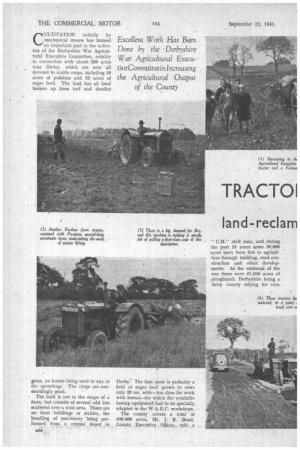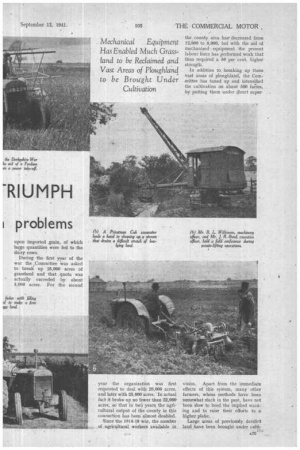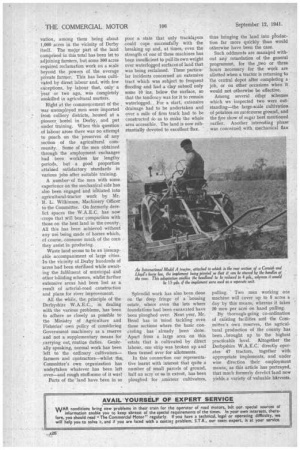TRACTOI
Page 26

Page 27

Page 28

If you've noticed an error in this article please click here to report it so we can fix it.
-RIUMPH CULTIVATION entirely by mechanical means has formed an important part in the activities of ,the Derbyshire War Agricultural Executive Committee, notably in connection with about 280 acres near Derby, which are now • all devoted to arable crops, including 50 acres of potatoes and 22 acres of sugar beet. The land has all beeri broken up from turf and derelict
grass, no horses being used in any of the operatioqs. The• crops are 'outstandingly good.
The land is not in the shape of a farm, but consists of several odd lots scattered over a wide area. There are no farm buildings or stables, the laandling of machinery being performed from a central depot in Derby. The best show is prcibably a field of sugar beet 'grown in rows only 20 ins, wide—too close for work with horses—for which the available hoeing equipment had to be specially, adapted in the W.A.E.C. workshops.
The county covers a total of 430,000 acres, Mr. J. R. Bond, County Executive Officer, told a
land-reciam
"
CM." staff man, and ,during the past 25 years s.ome 30,000 acres have been lost to agriculture through building, road construction and other developments. At the outbreak of the war there, were 67,000 acres of ploughland, Derbyshire being ,a dairy county relying for corn
upon imported grain, of which large quantities were fed to the dairy cows.
During the first year of the war the Committee was asked to break up 25,000 acres of grassland and that . quota was actually exceeded by about 5,000 acres. For the second
year the organization was first requested to deal with 20,000 acres, and later with 25,000 acres.' In actual fact it broke up no fewer than 32,000' acres, so that in two year the agricultural output of the county in this connection has been almost doubled.
Since the 1914-18 wax, the number of agricultural workers available in the county area has decreased from 12,000 to 8,000, but with the aid of mechanizedequipment '&e present labour force has performed work that then required a 50 per cent. higher strength.
In addition to. breaking up these vast areas of plougtdand, the Committee has tuned up and intensified the cultivation on about 500 fat"ms, by putting them under direct super
vision. Apart from the immediate effects of this system, many other farmers, whose methods have been somewhat slack in the past, have not been slow to heed the implied warn-ing and to raise their efforts to a
higher plahe.
Large areas of previously derelict land have been brought under vation, among them being about 1,000 acres in the vicinity of Derby itself. The n3ajer part of the land comprised in this total has been let to adjoining farnters, but some 300 acres required reclamation work on a scale beyond the powers of the average• private farmer. This has been cultivated by direct labour and, with few eicceptions, by labour that, only a year or two ago, was completely unskilled in agricultural matters.
Right at the commencement of the , war unemployed men were imported from colliery districts, housed at a pioneer hostel in Derby, and put under training. When this question of labour arose there was no attempt to poach on the -preserves of any section of the agricultural community. Some of the men obtained through the employment exchanges had been workless for lengthy periods, but a good proportion attained satisfactory standards in various jobs after suitable training.
A number. of the men with some experience on the mechanical side has also been engaged and initiated into agricultural-tractor work by Mr. R. L. Wilkinson, Machinery Officer to the Committee. On formerly derelict spaces the W.A.E.C. has now -crops that will bear comparison with those on the best land in the county. All this has been achieved without any use being made of horses which, of course, consume much of the corn they assist in producing.
Waste land seems to be an inescapable accompaniment of large cities. In the vicinity of Derby hundreds of acres had been stetilized while awaiting the fulfilment of municipal and other bililding schemes, whilst further extensive areas had been lost as a result of arterial-road construction and plans for river improvement.
All the while, the principle of the Derbyshire W.A.E.C., in dealing with the various problems, has been to adhere as closely as possible to the Ministry of Agriculture and Fisheries' own policy of considering Government machinery as a reserve and not a supplementary means for .carrying out routine duties. Generally speaking, normal work has been left to the ordinary cultivators— farmers and contractors—whilst the. Committee's own organization has undertaken whatever has been left over—and rough stuffsome of it was!
Parts of the land have been in so poor a state that only tracklayers could cope succe'ssfully with the breaking up and, at times, even the strength of one of these machines has been insufficient to pull its own weight over waterlogged surfaces of land that was being reclaimed. These particular incidents concerned an extensive tract which was subject to frequent flooding and had a clay subsoil only some 10 ins, below the surface, so that the tendency was for it to remain waterlogged. For a start, extensive drainage had to be undertaken and over a mile• of firm track had to be constructed go as to make the whole area accessible. The land is now substantially devoted to excellent flax. '
Splendid work has also been done on the deep fringe of a housing estate, where even the lots where foundations had been excavated have been ploughed over. Next year, Mr. Bond has in mind tackling even those sections where the basic concreting has already been done. Apart from a large area on this estate that is cultivated by direct labour, one strip was broken up and then turned over for allotments.
In this connection our representative learnt with interest that quite a number of small parcels of ground, half an acre'or so in extent, has been ploughed for amateur cultivators,
thus bringing the land into pi-oduction far more quickly than would otherwise have been the case.
Such .oddments are managed without any retardation of the general programme, for the two or three hours necessary for the work are allotted when a tractor is returning to the central depot after completing a job, or on other occasions when it would not otherwise be effective.
Among several other schemes which we inspected two were outstanding—the large-scale cultivation of potatoes on racecourse ground, and the fine show of sugar beet mentioned earlier. Another interesting phase was concerned with, mechanical flax pulling. ` Two men working one machine will cover up to 5 acres a day by this means, whereas it takes 20 men per acre on hand pulling.
By thorough-going co-ordination of exiiting facilities arid the Cornmittee's own reserves, the agricultural production of the county has been .brought up to the highest practicable level.. Altogether the Derbyshire W.A.E.C: directly operates47 tractors, together with appropriate implements, and -under wise direction their employment means,. as this article has portrayed, that much formerly derelict land now yields a variety of valuable harvests.




















































